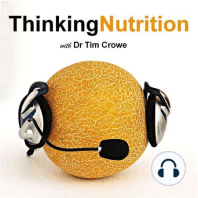20 min listen

‘Eat the rainbow’ really is good health advice
‘Eat the rainbow’ really is good health advice
ratings:
Length:
8 minutes
Released:
Aug 9, 2022
Format:
Podcast episode
Description
Advice to ‘eat the rainbow’ has been circulating in the nutrition sphere for some time. And no, it is not a call to action to get more Skittles in your life. Instead, it is all about choosing a variety of fruits and vegetables primarily based on their colour. Red, blue, orange, purple, yellow and green are the important colours here. And those colours occur because of the presence of a family of different polyphenol and other phytonutrient and other phytonutrients naturally found in foods. It is those coloured pigments that could explain many of the health benefits from eating these foods on your longevity, body weight, blood lipids and risk of chronic diseases such as type 2 diabetes and heart disease. In this podcast episode, I’ll explore the science behind ‘eating the rainbow’.Links referred to in the podcastReview of colourful pigments in fruits and vegetables and health https://www.mdpi.com/1420-3049/27/13/4061/htmEpisode transcriptTo access the full episode transcript, go to the following link and select the individual podcast episode and then click on the ‘Transcript’ tab https://thinkingnutrition.buzzsprout.comConnect with meInstagram: doctimcroweFacebook: Thinking NutritionTwitter: CroweTim
Released:
Aug 9, 2022
Format:
Podcast episode
Titles in the series (100)
Got iron? Foods, functions and insufficiencies by Thinking Nutrition